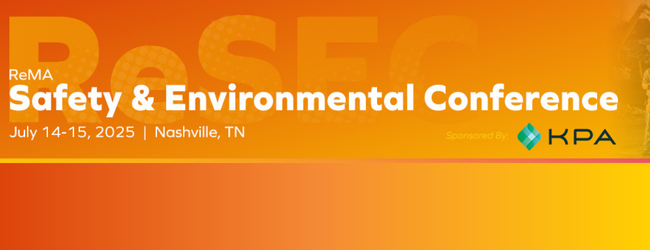Meet Dr. Judy Jeevarajan – Panelist at ReMA’s 2025 Safety and Environmental Conference
From July 14 to July 15, ReMA will be hosting the 2025 Safety and Environmental Conference (ReSec) in Nashville, Tennessee. Over the two-day event, industry leaders, safety professionals, and environmental experts will come together to tackle the most pressing challenges in the recycled materials industry. This event will provide attendees with cutting-edge insights, best practices, and regulatory updates to ensure a safer, more sustainable industry.
The event will include a variety of educational sessions on the following topics:
- Battery Handling, Storage, and Transportation
- Environmental Regulatory Update
- Employment Law Update
- Contractor Best Practices
ReMA News had the chance to chat with one of the speakers at ReSEC, Dr. Judy Jeevarajan, Vice President and Executive Director for the Electrochemical Safety Research Institute at UL Research Institutes. With more than 29 years of experience in batteries and a primary focus on lithium-ion chemistry, she specializes in battery safety research that encompasses various aspects from thermal runaway to fire suppression and recycling.

Can you tell me about your session at ReSEC. Why is battery safety an important issue for the recycled materials industry?
I’ll be speaking on the Electrochemical Safety Research Institute – UL panel on Monday, July 14th from 10:15 am to 12:00 pm. With the rise of lithium-ion and other battery technologies, safe handling and transportation have become increasingly critical. It’s important for recyclers to understand how to safely handle these batteries, how the batteries can become unsafe, and ways to mitigate the risks to better protect their workforces and the environment.
Tell me about the current challenges and opportunities regarding battery handling, management, and safety currently facing the recycled materials industry? What are some of them?
One major current challenge is that people are mixing batteries into their regular trash which can cause fires in trash pick-up trucks and materials recycling facilities (MRFs). The other issue we’re seeing is that people are mixing battery chemistries like lead acid and lithium-ion batteries. In other words, we’re seeing some lithium-ion batteries ending up in lead acid battery recycling facilities. This is a huge problem because the first step to recycling a lead acid battery is to crush the battery. However, crushing a lithium-ion battery can lead to a thermal event that could be catastrophic for the recycling facility. So, figuring out ways to keep the battery chemistries separate is necessary. We also need to determine how to safely handle lithium-ion batteries in the recycling process. For example, it’s safer to discharge lithium-ion batteries before you remove the electrodes for recycling. However, discharging the lithium-ion batteries one by one can be a long, time-consuming process. So, we need to look into methods of safely and efficiently discharging and disassembling large quantities of lithium-ion batteries.
After discharging the batteries and removing the electrodes then the active materials in the cathodes need to be recovered. We need to optimize the methods for recovering the cathode active materials, that is the expensive metals in the cathode. Currently, if you use environmentally friendly solvents, you can only recover 80-85% of the materials but you can recover more than 90% of materials by using strong acids. The challenges don’t stop at recovery. One has to use the metals recovered and synthesize new cathode active materials which can also be a challenging process.
There are plenty of opportunities based on all these challenges for more research to be done and more innovative methods for safely handling and processing these batteries.
Who should attend ReSec? What can attendees expect to learn from it?
I recommend battery recyclers and companies planning to collect and process the batteries for recycling, should attend so they can better understand battery safety, particularly with regards to safely handling and processing lithium-ion batteries. In addition to recyclers, researchers, and institutions should attend to discuss their work in these areas and identify any gaps that can be filled in with research. This forum will also be useful for regulators and policymakers because they’re the ones thinking about environmental safety and how this work can be done in a safe manner.
I hope attendees come away from my session and from the event with a clearer understanding of battery safety and why they need to keep safety at the forefront when working with lithium-ion batteries. Handling these batteries incorrectly can result in catastrophic failures. So it is critical to understand the hazards associated with recycling these lithium-ion batteries and develop proper policies and regulations for handling these batteries safely.
What are you most excited for at ReSEC 2025?
I’ve been looking over the sessions at the conference and I see that there are several interesting sessions on battery safety as well as environmental regulations. I also learned that there is a session on hydrogen vehicles. Toyota is doing a session on Tuesday, July 15th on hydrogen vehicle dismantling at 8 am. It’s different than the batteries we’re currently dealing with, but I think hydrogen is going to be the next generation of hybrid electric vehicles. We are going to see people using hydrogen as fuel or in a hybrid form with a battery in vehicles. Attending ReSEC will help me better anticipate what’s coming down the pipeline in this space and I’m excited to talk to the different attendees and speakers about their efforts and learn more from the presentations and sessions.
